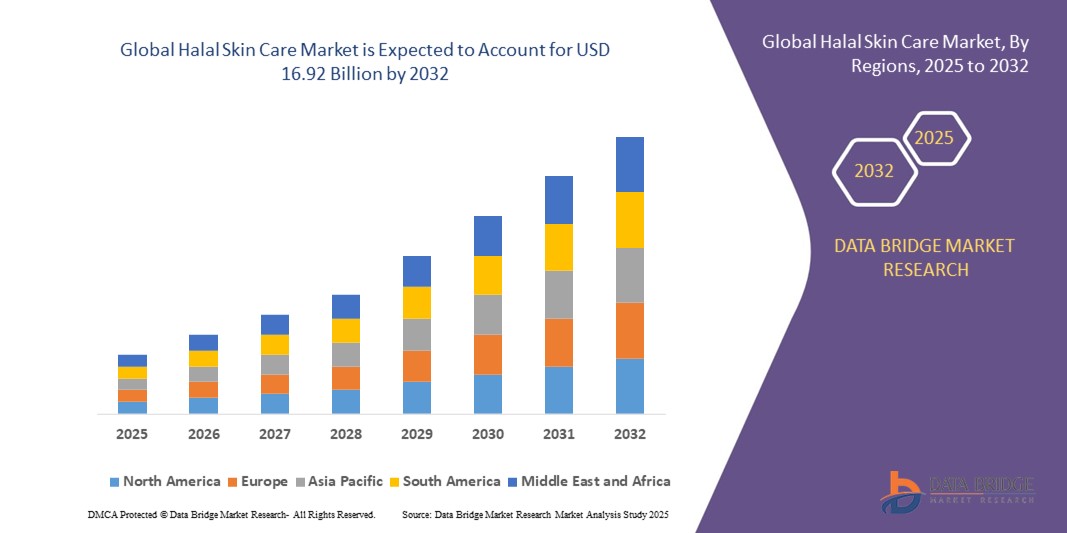世界のハラールスキンケア市場規模、シェア、トレンド分析レポート
Market Size in USD Billion
CAGR :
% 
 USD
11.80 Billion
USD
16.92 Billion
2024
2032
USD
11.80 Billion
USD
16.92 Billion
2024
2032
| 2025 –2032 | |
| USD 11.80 Billion | |
| USD 16.92 Billion | |
|
|
|
|
世界のハラールスキンケア市場のセグメンテーション、製品別(パーソナルケア、スキンケア、ヘアケア、カラーコスメ、フェイス、アイ、リップ、ネイル、フレグランス)、用途別(ヘアケア、スキンケア、ビューティーケア、フェイスケア、その他)、流通チャネル別(ヘアケア、スキンケア、ビューティーケア、フェイスケア、その他) - 2032年までの業界動向と予測
ハラールスキンケア市場規模
- 世界のハラールスキンケア市場規模は2024年に118億米ドルと評価され、予測期間中に4.6%のCAGRで成長し、2032年までに169.2億米ドルに達すると予想されています。
- 市場の成長は、倫理的、自然派、そして宗教的基準を満たした美容製品に対する消費者の嗜好の高まりに大きく牽引されており、スキンケアや化粧品においてハラール認証が重要な差別化要因として浮上しています。有害化学物質、動物由来成分、そして動物実験をしない慣行に対する意識の高まりにより、世界市場においてハラール認証ソリューションの需要が高まっています。
- さらに、eコマースプラットフォーム、専門店、大手小売チェーンを通じてハラール認証スキンケア製品がますます入手しやすくなり、その普及が加速しています。健康志向の購買、文化的な調和、そしてハラール認証に対する規制当局の支援が相まって、業界の拡大が著しく促進されています。
ハラールスキンケア市場分析
- ハラールスキンケア製品は、アルコール、動物由来成分、刺激の強い化学物質を含まない認証処方で、宗教的理念と現代のクリーンビューティー基準の両方を満たすように設計されています。これらの製品には、保湿剤、美容液、洗顔料、化粧品などがあり、安全で倫理的な選択肢を求めるイスラム教徒と非イスラム教徒の両方の消費者にアピールします。
- ハラールスキンケアの需要の高まりは、主に可処分所得の増加、都市人口の増加、そして持続可能で透明性の高い美容へのシフトによって促進されています。認証の保証に加え、ソーシャルメディア、インフルエンサーマーケティング、そして世界的なハラールブランドの拡大の影響により、ハラールスキンケアは化粧品業界全体において急成長を遂げている分野となっています。
- 認証されたハラール美容・パーソナルケア製品への高い需要と、倫理的かつ宗教に準拠した処方に対する消費者の嗜好の高まりにより、中東とアフリカは2024年にハラールスキンケア市場を支配した。
- アジア太平洋地域は、都市化の進展、可処分所得の増加、そしてマレーシア、インドネシア、シンガポールなどの国におけるハラール認証美容製品への嗜好の高まりにより、予測期間中にハラールスキンケア市場で最も急速に成長する地域になると予想されています。
- スキンケア分野は、倫理的でクリーンな美容製品に対する消費者意識の高まりにより、2024年には39%の市場シェアを獲得し、市場を牽引しました。保湿剤、美容液、フェイシャルトリートメントにおいて、天然由来、動物実験をしていない、化学薬品不使用の成分への嗜好が高まっていることが、需要を押し上げています。ハラール認証を取得したスキンケア製品は、純度とイスラム教の原則への準拠を保証し、イスラム教徒だけでなく、意識の高い非イスラム教徒の消費者も惹きつけています。eコマースプラットフォームの急成長、革新的な製品の発売、インフルエンサー主導のマーケティングが相まって、ハラールスキンケア製品の世界的な普及をさらに促進しています。
レポートの範囲とハラールスキンケア市場のセグメンテーション
|
属性 |
ハラールスキンケアの主要市場分析 |
|
対象セグメント |
|
|
対象国 |
北米
ヨーロッパ
アジア太平洋
中東およびアフリカ
南アメリカ
|
|
主要な市場プレーヤー |
|
|
市場機会 |
|
|
付加価値データ情報セット |
データブリッジマーケットリサーチがまとめた市場レポートには、市場価値、成長率、セグメンテーション、地理的範囲、主要プレーヤーなどの市場シナリオに関する洞察に加えて、専門家による詳細な分析、価格設定分析、ブランドシェア分析、消費者調査、人口統計分析、サプライチェーン分析、バリューチェーン分析、原材料/消耗品の概要、ベンダー選択基準、PESTLE分析、ポーター分析、規制の枠組みも含まれています。 |
ハラールスキンケア市場の動向
皮膚の健康と安全基準への意識の高まり
- 肌の健康に対する消費者意識の高まりと安全基準の強化により、ハラールスキンケア市場は力強い成長を遂げています。消費者は、有害な化学物質、アルコール、動物由来成分を含まない製品、規制基準や宗教的遵守、そして皮膚科学的な安全要件を満たす製品を選ぶ傾向が高まっています。
- 例えば、ワルダーとIBAハラールケアは、シャリーアの原則に準拠した安全でアルコールフリー、動物実験をしていない製品を提供することで、ハラールスキンケア分野で確固たる地位を築いています。また、毒素フリーで倫理的に製造された化粧品を求める幅広い消費者層にも訴求しています。同様に、ユニリーバなどの多国籍企業は、アジア太平洋地域と中東における需要の高まりに対応するため、ハラール認証製品ラインを拡大しています。
- クリーンラベルスキンケアのトレンドは、製品の純度、安全性、透明性の証として、ハラール認証の魅力を高めています。消費者によるラベルや成分に対する監視の強化は、イスラム教徒と非イスラム教徒の両方のセグメントにおいて、ハラールスキンケアブランドへの信頼と選好を直接的に高めています。
- 大気汚染、ホルモンバランスの乱れ、ライフスタイルの変化に関連する皮膚疾患の増加に伴い、皮膚科医による安全性を保証する製品への需要も高まっています。ハラール処方は、化学物質を多く含む化粧品に代わる、より優しく安全な代替品として位置付けられており、敏感肌層への使用がさらに広がっています。
- 結論として、肌の健康に対する意識の高まりと安全基準の重要性は消費者の選択に直接影響を与えており、ハラール認証を受けたスキンケアが人口統計や地域の境界を越えて持続的に普及し続けることを保証している。
ハラールスキンケア市場のダイナミクスドライバー
倫理的かつハラール認証を受けた製品に対する需要の増加
- 倫理的で透明性が高く、ハラール認証を受けた製品に対する消費者の需要の高まりは、ハラールスキンケア市場の重要な推進力となっています。認証は、宗教的価値観と世界的な倫理基準の両方への準拠を保証するものであり、安全で動物実験をせず、環境に配慮した選択肢を求める多様な消費者層にアピールします。
- 例えば、アマラ・ハラール・コスメティックスは、イスラム教徒以外の意識の高い消費者にも訴求できるハラール認証、ヴィーガン、無毒製品に注力することで、北米で存在感を高めています。同様に、ワルダーとサフィは、宗教的遵守に加え、倫理的な調達と持続可能な慣行を統合することで、ハラール認証製品の提供を拡大しています。
- 倫理的な消費主義の潮流が広がり、メーカーはクルエルティフリーテスト、環境に配慮したパッケージ、天然オーガニック配合など、持続可能性の取り組みに沿ったスキンケア製品の提供を求めています。ハラール認証は、品質、安全性、そして倫理的責任のさらなる保証となります。
- ハラールビューティーとより広範な倫理的消費運動との連携により、対象市場は大幅に拡大する。
- 同社は、ハラールスキンケアをニッチな宗教製品として、また健康志向で持続可能性を重視する世界中の消費者を惹きつける主流の倫理的選択肢として位置付けています。
抑制/挑戦
既存ブランドとの競争
- ハラールスキンケア市場における大きな課題は、世界的な美容・パーソナルケアブランドとの熾烈な競争です。著名な多国籍企業が既に棚スペース、流通チャネル、マーケティング予算を独占しているため、小規模なハラール専門ブランドが世界規模で認知度を高め、事業を拡大することは困難です。
- 例えば、ロレアルやプロクター・アンド・ギャンブルといった世界的な巨大企業は、既存のポートフォリオに自然派や「クリーンビューティー」のラインをますます取り入れています。これらの製品は必ずしもハラール認証を受けているわけではありませんが、安全で動物実験をしていない、化学薬品不使用の製品を求める消費者のニーズに応えることで直接競合しており、主流市場におけるハラールブランドの差別化を制限しています。
- 激しい競争は価格戦略にも影響を与えます。大規模な多国籍企業は規模の経済性を活かし、小規模なハラールブランドがしばしば追随できないような競争力のある価格設定と幅広いプロモーションを展開することができます。これは、ハラールへの認知度がまだ発展途上にある非伝統的市場における成長機会を減少させています。
- さらに、確立された国際ブランドは、消費者からの強い信頼、広範なグローバル小売ネットワーク、そして高度な研究開発投資を享受していることが多い。これは、既存の市場リーダーと競争しながら、消費者に正当性、有効性、そして価値を納得させなければならない新興ハラールブランドにとって、参入障壁となる。
- その結果、既存の美容・スキンケアブランドとの競争は依然として構造的な課題となっています。ハラール企業は、競争の激しい市場環境において差別化を図り、長期的な成長を確保するために、強力な認証、ブランドの信頼性、ターゲットを絞った認知度向上キャンペーン、そして製品イノベーションを重視する必要があります。
ハラールスキンケア市場の展望
市場は、製品、アプリケーション、流通チャネルに基づいてセグメント化されています。
- 製品別
製品別に見ると、ハラールスキンケア市場は、パーソナルケア、スキンケア、ヘアケア、カラーコスメ、フェイス、アイ、リップ、ネイル、フレグランスに分類されます。スキンケア分野は、倫理的でクリーンな美容製品に対する消費者意識の高まりを背景に、2024年には39%という最大の収益シェアで市場を席巻しました。保湿剤、美容液、フェイシャルトリートメントにおいて、天然由来、動物実験なし、化学薬品不使用の成分への嗜好が高まり、需要が高まっています。ハラール認証を取得したスキンケア製品は、純度とイスラム教の原則への準拠を保証し、イスラム教徒だけでなく、意識の高い非イスラム教徒の消費者も惹きつけています。eコマースプラットフォームの急成長に加え、革新的な製品の発売やインフルエンサー主導のマーケティングが相まって、ハラールスキンケア製品の世界的な普及をさらに促進しています。
パーソナルケア分野は、包括的なハラール認証を受けたグルーミングルーティンへの消費者志向の高まりを背景に、2025年から2032年にかけて最も高い成長率を達成すると予想されています。ボディウォッシュ、デオドラント、ローションなどの製品は、倫理的な処方と敏感肌への適合性から人気が高まっています。ソーシャルメディアの影響力の高まりに加え、倫理的、持続可能、そして健康志向のライフスタイルに合致する製品への需要の高まりが、市場浸透を加速させています。パーソナルケア製品は、より幅広い顧客層を獲得するためにハラール認証ポートフォリオを拡大するブランドにとって、重要な焦点となりつつあります。
- アプリケーション別
用途別に見ると、ハラールスキンケア市場はヘアケア、スキンケア、美容ケア、フェイスケア、その他に分類されます。スキンケア用途セグメントは、ハラール基準に準拠した毎日のスキンケアルーティンを重視する消費者の高まりにより、2024年には最大の市場収益シェアを占めました。従来のスキンケアに含まれる有害な化学物質や合成成分に対する懸念の高まりから、認証を受けたハラール代替品への需要が高まっています。都市化の進展、可処分所得の増加、そしてウェルネストレンドの影響も、特にミレニアル世代とZ世代の消費者の間で普及を促進しています。ハラール認証を受けたフェイスマスク、クリーム、美容液は、倫理的な調達と優しい処方でますます認知され、市場での優位性をさらに強化しています。
美容ケア分野は、メイクアップ、角質除去剤、スパトリートメントにおけるハラール製品の導入増加に牽引され、2025年から2032年にかけて最も高いCAGRを記録すると予測されています。消費者は、外見を美しくするだけでなく、宗教的、倫理的、そしてクリーンラベルの基準を満たす製品を求めています。オンライン美容プラットフォーム、ソーシャルメディアでのプロモーション、インフルエンサー主導の啓発キャンペーンの急増は、ハラール美容ケア製品の普及を加速させています。さらに、包括的で多様な処方への関心の高まりは、ブランドがこの分野全体でハラール認証製品の拡充を進めていることを後押ししています。
- 流通チャネル別
流通チャネルに基づいて、ハラールスキンケア市場は、ハイパーマーケット&スーパーマーケット、専門店、オンライン小売、その他に分類されます。2024年には、オンライン小売セグメントが市場を席巻しました。これは、宅配の利便性、豊富な製品バリエーション、そして検証済みのハラール認証ブランドへのアクセスが牽引役となっています。特に新興市場におけるeコマースの急速な普及により、オンラインプラットフォームはテクノロジーに精通し、意識の高い消費者にとって好ましい選択肢となっています。これらのプラットフォームでは、詳細な製品情報、レビュー、そしてハラール認証の容易な比較が可能であり、消費者の信頼を高め、購入を促進します。
専門店セグメントは、厳選されたハラールスキンケアコレクションと専門家によるおすすめ商品への需要の高まりを背景に、2025年から2032年にかけて最も高い成長が見込まれています。専門店は、パーソナライズされた体験、専門家によるアドバイス、そしてニッチなハラール認証製品への限定アクセスを提供します。ブランドコラボレーション、ポップアップイベント、店内キャンペーンの増加が成長に貢献するとともに、購入前に実際に製品を試用したいという消費者の嗜好も、このチャネルを引き続き強化しています。専門知識、信頼性、そして厳選された商品の組み合わせにより、専門店は高成長が見込まれる流通経路としての地位を確立しています。
ハラールスキンケア市場の地域分析
- 中東とアフリカは、認証されたハラール美容およびパーソナルケア製品への高い需要と、倫理的かつ宗教に準拠した処方に対する消費者の嗜好の高まりにより、2024年に最大の収益シェアでハラールスキンケア市場を支配しました。
- この地域の消費者は、ハラール認証の保証、天然で動物実験をしていない原材料、敏感肌に合わせた製品の入手可能性を高く評価しています。
- この広範な採用は、可処分所得の増加、ハラールライフスタイル製品に対する意識の高まり、強力な小売および電子商取引インフラによってさらに支えられ、ハラールスキンケアが地域全体で好ましい選択肢として確立されています。
UAEハラールスキンケア市場に関する洞察
UAEは、堅調な小売セクター、高い可処分所得、そしてハラール認証を受けたスキンケア・パーソナルケア製品を積極的に求める人口の多さに支えられ、2024年に中東・アフリカ地域で最大の収益シェアを獲得しました。消費者はプレミアムで倫理的、そして天然由来の処方を重視しており、国際的なハラール認証ブランドの存在は市場の多様性を高めています。オンラインプラットフォームの普及、インフルエンサー主導のマーケティング、そしてラグジュアリービューティーのトレンドが相まって、個人向けと業務用の両方の分野でハラールスキンケア製品の普及がさらに加速しています。
ヨーロッパのハラールスキンケア市場に関する洞察
欧州のハラールスキンケア市場は、多文化人口の増加と倫理的でクリーンな美容製品への需要の高まりを背景に、予測期間中に大幅なCAGRで拡大すると予想されています。英国やドイツなどの国では、原料の安全性、持続可能性、そして動物実験をしない基準に対する意識の高まりにより、ハラール認証を受けたスキンケア製品やパーソナルケア製品の導入が急速に進んでいます。小売店や専門店では、認証を受けたハラール製品の提供が増えており、eコマースプラットフォームの拡大により、多様な消費者層へのアクセスがさらに強化されています。
英国のハラールスキンケア市場に関する洞察
英国のハラールスキンケア市場は、倫理的で透明性が高く、宗教的基準を満たしたパーソナルケア製品に対する消費者の需要に牽引され、予測期間中に注目すべきCAGRで成長すると予測されています。ハラール認証への意識の高まりと、健康、ウェルネス、美容トレンドの影響力の高まりは、小売業者とブランドの両方がハラール製品の提供を拡大することを後押ししています。堅固なeコマースインフラとオンライン美容マーケットプレイスの普及拡大は、引き続き市場の成長を支えていくと予想されます。
ドイツのハラールスキンケア市場に関する洞察
ドイツのハラールスキンケア市場は、クリーンでナチュラル、そしてハラール認証を受けた製品に対する消費者の意識の高まりを背景に、予測期間中に大幅なCAGRで拡大すると予想されています。ドイツの充実した小売ネットワークと、倫理的、持続可能、そしてヴィーガン向けの美容製品への需要の高まりが相まって、市場への浸透を促進しています。専門店、オーガニックショップ、そしてオンラインプラットフォームの人気が高まっていることも、パーソナルケアとプロフェッショナルケアの両方の分野でハラールスキンケアソリューションの浸透に貢献しています。
アジア太平洋地域のハラールスキンケア市場に関する洞察
アジア太平洋地域のハラールスキンケア市場は、都市化の進展、可処分所得の増加、そしてマレーシア、インドネシア、シンガポールなどの国々におけるハラール認証美容製品への嗜好の高まりを背景に、予測期間中に最も高いCAGRで成長する見込みです。この地域における強力なハラール認証の枠組みと、クリーンで倫理的な処方への意識の高まりが相まって、ハラール製品の普及を加速させています。政府のハラール産業促進策に加え、eコマースとソーシャルメディアマーケティングの成長により、より幅広い消費者層において製品の認知度とアクセス性が向上しています。
日本のハラールスキンケア市場に関する洞察
日本のハラールスキンケア市場は、自然派、倫理的、そしてクリーンな美容製品への消費者の関心の高まりにより、着実な成長を遂げています。健康志向の高いムスリムの消費者の間では、ハラール認証スキンケアへの需要が高まっています。プレミアムスキンケアラインへのハラール製品の導入、ウェルネストレンドの影響、そしてオンラインショッピングプラットフォームの普及が、市場拡大を牽引しています。日本の消費者は高品質で安全かつ効果的な処方を好むため、ハラールスキンケアの普及をさらに後押ししています。
中国ハラールスキンケア市場に関する洞察
中国のハラールスキンケア市場は、都市化の進展、可処分所得の増加、そしてクリーンで倫理的な美容製品の普及により、2024年にはアジア太平洋地域で最大の収益シェアを占めると予測されています。中流階級人口の増加とハラール認証製品への認知度の高まりが相まって、スキンケア、パーソナルケア、美容分野における需要を促進しています。オンライン小売プラットフォームの拡大とインフルエンサー主導のマーケティングキャンペーンは、中国全土におけるハラールスキンケア製品の認知度と普及をさらに加速させています。
ハラールスキンケア市場シェア
ハラールスキンケア業界は、主に次のような老舗企業によって牽引されています。
- ワルダ(インドネシア)
- TNSスキンラボ(マレーシア)
- ミスク・アル・ファウズ(サウジアラビア)
- アル・ハラメイン・パフュームズ(UAE)
- スナナチュラルSL(トルコ)
- ノーリッシュ・ロンドン(英国)
- イブティッサム・ビューティー(米国)
- サドサトリアム(オーストラリア)
- ハーブ&エッセンス(バングラデシュ)
- Shopify によるジューシーケミストリー(インド)
世界のハラールスキンケア市場の最新動向
- 2022年11月、Iba Cosmeticsはシンガポールに拠点を置くBelieve Companyと提携し、流通ネットワークを強化し、中東、ヨーロッパ、南アジアにおける市場プレゼンスを拡大しました。100億米ドルの投資コミットメントを伴うこの提携により、Iba Cosmeticsのグローバル展開が加速し、主要な成長市場におけるハラール認証製品のより広範なアクセスが可能になります。この提携により、Iba Cosmeticsの物流および小売能力が強化されるだけでなく、認証ハラール製品に対する消費者の信頼も高まり、倫理的かつ宗教的に準拠した美容ソリューションへの需要が高い地域における長期的な成長を支えることになります。
- 2022年4月、Inika Organicは新しい化粧品ライン「Pure with Purpose」を発売しました。このラインには、ラッシュ&ブロウセラム、ハイドレーティングトーニングミスト、アイシャドウクアッド、ブロウパレットが含まれています。100%天然由来成分、ヴィーガン認証、ハラール認証、そしてクルエルティフリーを謳うこのラインは、クリーンでサステナブル、そして倫理的な美容を求める世界的なトレンドに応えています。今回の発売により、Inika Organicはプレミアムハラールスキンケアおよび化粧品分野における地位を強化するとともに、透明性、安全性、そして多機能な美容ソリューションを求める消費者のニーズに応えています。この取り組みは、ブランドが認証を活用し、イスラム教徒の消費者だけでなく、より幅広い倫理意識の高い顧客層へと訴求力を拡大していることにも光を当てています。
- 韓国のハラール化粧品メーカーであるKolmar Korea Co., Ltd.は、2022年9月、ハラール認証製品の供給を通じてUAEでの事業拡大計画を発表しました。この戦略的な事業拡大は、認証済みで安全かつ高品質な製品を積極的に求める消費者が集中している中東の急成長中のハラール美容市場への参入を目指しています。UAEに拠点を設立することで、Kolmar Koreaは知名度を高め、地域におけるブランド認知度を強化するとともに、競争の激しい国際市場においてハラール認証が重要な差別化要因となるという世界的な潮流に合致することになります。
- ドバイを拠点とする化粧品ブランドMikyajyは、2021年10月、COVID-19パンデミックによって消費者の衛生と製品の安全性への関心が高まったことを受け、口紅を含むハラール認証化粧品ラインを導入しました。持続可能で衛生的なハラール製品の発売により、Mikyajyは倫理的で信頼できる美容ソリューションに対する高まる消費者の期待に応えることができました。この展開は、中東のハラール化粧品分野におけるMikyajyの地位を確固たるものにするとともに、消費者の信頼を得るために、健康、持続可能性、認証基準を統合することの重要性を強調しました。
- 2021年8月、日本を拠点とする花王株式会社は、ライオン株式会社と共同で、ハラール認証化粧品用のリサイクル可能なパッケージを開発しました。これは、環境への影響を軽減し、プラスチック廃棄物を最小限に抑えることを目指しています。この取り組みは、持続可能性とハラールコンプライアンスの融合を強調し、世界中の環境意識の高い消費者にアピールするものです。倫理的な美容基準と環境に配慮した慣行を組み合わせることで、花王株式会社は責任ある化粧品製造のリーダーとしての地位を確立し、ブランド価値を高め、国内外の市場におけるハラール認証製品の長期的な普及を支援しています。
SKU-
世界初のマーケットインテリジェンスクラウドに関するレポートにオンラインでアクセスする
- インタラクティブなデータ分析ダッシュボード
- 成長の可能性が高い機会のための企業分析ダッシュボード
- カスタマイズとクエリのためのリサーチアナリストアクセス
- インタラクティブなダッシュボードによる競合分析
- 最新ニュース、更新情報、トレンド分析
- 包括的な競合追跡のためのベンチマーク分析のパワーを活用
調査方法
データ収集と基準年分析は、大規模なサンプル サイズのデータ収集モジュールを使用して行われます。この段階では、さまざまなソースと戦略を通じて市場情報または関連データを取得します。過去に取得したすべてのデータを事前に調査および計画することも含まれます。また、さまざまな情報ソース間で見られる情報の不一致の調査も含まれます。市場データは、市場統計モデルと一貫性モデルを使用して分析および推定されます。また、市場シェア分析と主要トレンド分析は、市場レポートの主要な成功要因です。詳細については、アナリストへの電話をリクエストするか、お問い合わせをドロップダウンしてください。
DBMR 調査チームが使用する主要な調査方法は、データ マイニング、データ変数が市場に与える影響の分析、および一次 (業界の専門家) 検証を含むデータ三角測量です。データ モデルには、ベンダー ポジショニング グリッド、市場タイムライン分析、市場概要とガイド、企業ポジショニング グリッド、特許分析、価格分析、企業市場シェア分析、測定基準、グローバルと地域、ベンダー シェア分析が含まれます。調査方法について詳しくは、お問い合わせフォームから当社の業界専門家にご相談ください。
カスタマイズ可能
Data Bridge Market Research は、高度な形成的調査のリーダーです。当社は、既存および新規のお客様に、お客様の目標に合致し、それに適したデータと分析を提供することに誇りを持っています。レポートは、対象ブランドの価格動向分析、追加国の市場理解 (国のリストをお問い合わせください)、臨床試験結果データ、文献レビュー、リファービッシュ市場および製品ベース分析を含めるようにカスタマイズできます。対象競合他社の市場分析は、技術ベースの分析から市場ポートフォリオ戦略まで分析できます。必要な競合他社のデータを、必要な形式とデータ スタイルでいくつでも追加できます。当社のアナリスト チームは、粗い生の Excel ファイル ピボット テーブル (ファクト ブック) でデータを提供したり、レポートで利用可能なデータ セットからプレゼンテーションを作成するお手伝いをしたりすることもできます。














